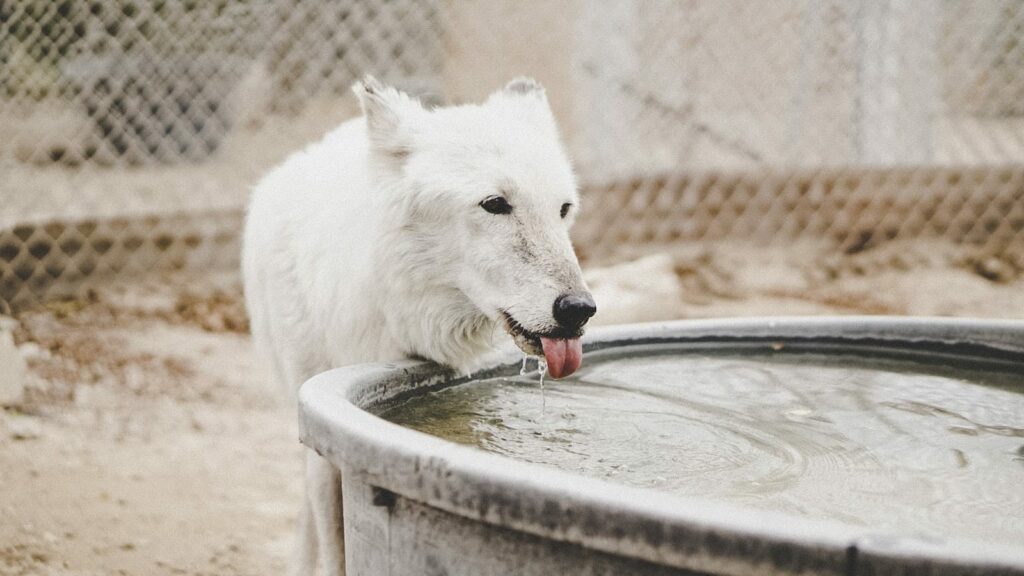If you’re one of the 15% of the population relying on private wells for clean water, you might wonder: Is well water safe for dogs? Although suitable for us, it’s not always the best choice for our furry friends. Contamination risks such as germs, nitrates, and heavy metals in well water can prove hazardous to dogs.
Hard water, characterized by high mineral content, can also be problematic for dogs. However, if treated or filtered, well water can be safe for your canine companion.

The Unseen Dangers in Well Water
The innocuous well water could harbor a variety of threats to your pet. One such peril is Giardia, a single-celled parasite residing in the intestines of animals. Dogs can contract Giardia by consuming water tainted with feces, potentially leading to mild symptoms like vomiting or severe consequences like death. Contaminated well water from other animals’ feces can often spread Giardia to dogs.
To circumvent such an event, regularly test your water for parasites and bacteria. It’s crucial to remember that while underground aquifers naturally filter well water, they cannot completely eliminate all contaminants before a dog sips from a well.
A few other contaminants often found in well-water systems include:
- Hepatitis A
- Cryptosporidium
- Campylobacter
- Shigella
- Harmful materials like gasoline, nitrate, or arsenic
If you live on a farm or near an industry, run-off can affect your well water. Harmful cleaning agents and chemicals seeping into the groundwater can render it risky for consumption.
Choosing the Right Water for Your Dog
Tap water usually stands as the best choice for your dog. More affordable than recurrently purchasing bottled water, tap water provides all essential nutrients and minerals without the same contamination risk as well water.
Ensuring your dog stays hydrated is just as important as it is for humans, given that a dog’s body comprises over 70% water. But locating an ideal water source can be tricky. Standing water in a lake, pond, or other nearby body of water might seem tempting for a pet, but it can cause significant harm to dogs.
Despite appearing safe, distilled water lacks the vital minerals necessary for proper hydration in dogs. Thus, it’s recommended to offer your dog only modest amounts of distilled water.
Answers to Your Frequently Asked Questions
Can well water give dogs diarrhea?
Yes, the presence of various bacteria and microbes can trigger stomach issues in your dog, along with potential problems with the neurological and urinary systems.
Can dogs drink bottled water?
Bottled water, while convenient, isn’t the best choice for dogs or humans due to its environmental impact and potential for toxic substances like BPA. The linkage of BPA to cancer and hormonal issues makes bottled water less advisable.
Can dogs drink too much water?
Excessive water consumption can make dogs sick, especially during the hot summer months. If your dog gets ill after drinking too much water, it could indicate a more severe condition. Consult with your veterinarian in such cases.
Ensuring Your Dog’s Wellbeing
Well, water may contain several hazardous contaminants that can harm dogs, posing risks that could result in serious health issues. When it comes to your dog’s health, don’t compromise on the quality of your well water. Regularly test your water, utilize a softener, or invest in a whole-house filtering system to guarantee your pet’s safety.
Remember to provide your dog with sufficient fresh water every day to prevent dehydration. If you’re uncertain about the quality of your well water, seek expert advice. Your pet’s health and safety are worth it.

Jay
Jay is a health and wellness enthusiast with expertise in water quality and nutrition. As a knowledgeable advocate for holistic well-being, Jay successfully manages Type 2 Diabetes through informed lifestyle choices. Committed to sharing reliable and authoritative insights, Jay combines firsthand experience with a passion for enhancing health."
